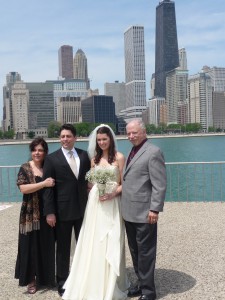Celebrating the Celebrants: A Profile of Janis Levin-Gorelick

Janis Levin-Gorelick became certified as a Humanist Minister with the Humanist Society in 1995. Since then, she has been successful in her field and in 2011, joined the Humanist Society Board of Directors. The Humanist Society, an adjunct of the American Humanist Association, is a professional organization that certifies humanist celebrants to legally perform weddings. Since last year, the Society has also provided training for humanist celebrants at the American Humanist Association’s conference. The session returns this year in New Orleans. In addition to weddings, humanist celebrants also perform baby naming ceremonies, rites of passage, and funerals. Here, Janis talks to HNN about being a celebrant and its rewards.
HNN: How did you decide to become a celebrant?
Janis Levin-Gorelick: I was always fascinated with religion and studied everything I could find on the subject. Plus, I love working with people and became a social worker. The more I studied religion, the more convinced I became that I was an atheist/humanist and traditional clergy roles wouldn’t work for me. If Humanistic Rabbinical training had been available when I was younger, I would have done that.
HNN: Did you get any type training to become a celebrant? If so, what?
Janis Levin-Gorelick: I graduated with the first class at the Humanist Institute. I also completed the Madrikha program through the Leadership Conference of Secular and Humanistic Jews (LHSHJ) and three years of rabbinical training with Rabbi Sherwin Wine.
HNN: What does it take to become a celebrant?
Janis Levin-Gorelick: For me, the role is larger than just being a celebrant. I see it as more of a ministerial role that includes helping people celebrate life-cycle ceremonies as well as counseling as necessary. I think having problem solving skills is extremely important.
HNN: What types of challenges do you face as a celebrant?
Janis Levin-Gorelick: I think the financial/business/advertising aspect is something that I wouldn’t face if I was part of a larger congregation or community. I don’t really like having to ‘sell’ myself. Also, I find the challenge of dealing with personal attacks on my philosophy disturbing.
HNN: What’s the best part of being a celebrant?
Janis Levin-Gorelick: The “aha!” moment when a person is thrilled to find out that there is a group of like-minded people called humanists and that they are not alone. There are many other great times, specifically when you know you have helped people through a difficult time like a death or funeral, but the “aha!” moment wins for me.
HNN: What role, do you think, do humanist celebrants play in the humanist movement and community?
Janis Levin-Gorelick: I have educated so many people about humanism and shown them that they don’t have to re-invent the wheel—there are like-minded groups all over the country with resources for them and their children. I feel like we are the grassroots of the movement and are partially responsible for the increase in people feeling more comfortable identifying themselves as “Good without god.”
HNN: Would you recommend celebrancy as a career path for other people? What would you recommend to those looking into celebrancy as a career choice?
Janis Levin-Gorelick: I would recommend it as a career, as long as they knew it was likely they would have to have a day job too unless they were able to make it into a full-time career. I find it enormously rewarding.
Eric Nguyen is the field coordinator for the American Humanist Association and program coordinator for The Humanist Society.
Interested in becoming a Humanist Celebrant? Celebrants are eligible to perform humanist and secular weddings, funerals, and other life ceremonies. Visit The Humanist Society at www.humanist-society.org to learn more about how to apply. There will also be a Celebrant Training Session at the 71st Annual Conference of the American Humanist Association, to be held June 7, 2012. For more details, visit www.americanhumanist.org/conference.
